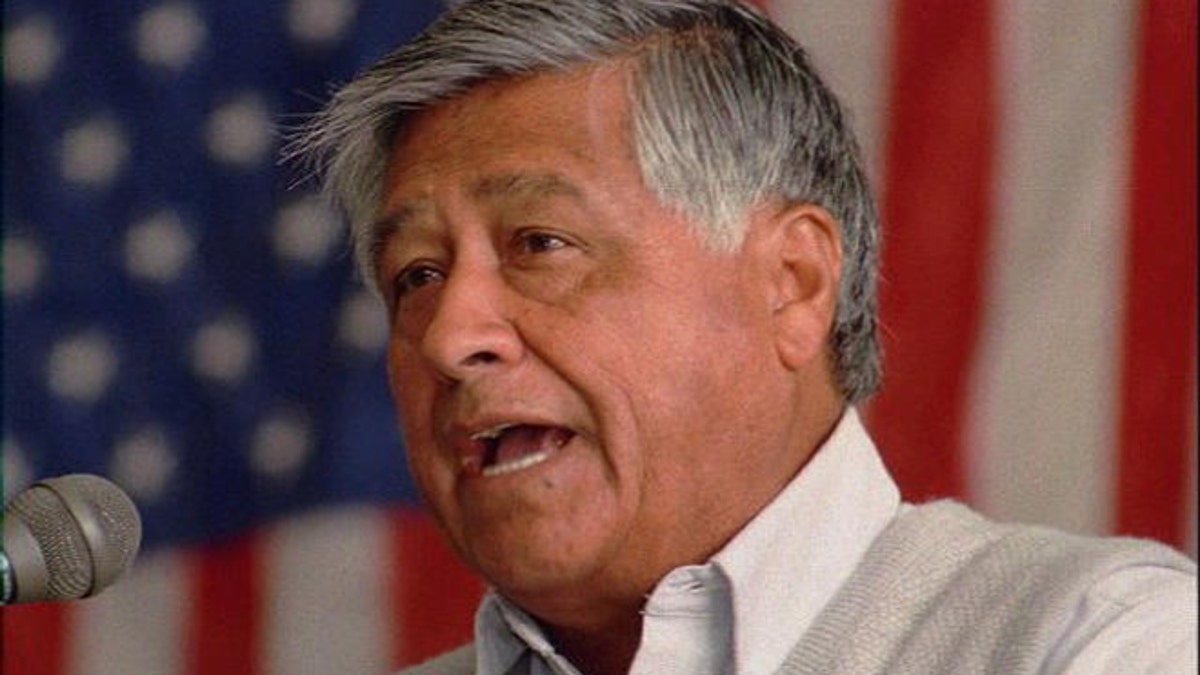
(AP)
The protectors of the Cesar Chavez legacy describe the legendary leader as “an ordinary man” who did extraordinary things.
Like much of the mythology that has grown around Chavez, this oversimplification does him a disservice and masks the reality. It’s a nice slogan, but in fact, Cesar Chavez was anything but ordinary. He was fanatical and visionary, driven to achieve the seemingly impossible, and endowed with the remarkable intelligence and talent to make history.
Our union’s survival, its very existence, sent out a signal to all Hispanics that we were fighting for our dignity, that we were challenging and overcoming injustice, that we were empowering the least educated among us, the poorest among us.
The man born 87 years ago today worked with a single-minded intensity few could ever match. For a time, that zeal produced unprecedented gains for California farmworkers. But the union he founded failed to thrive and has become irrelevant; farmworkers today know Cesar Chavez only as the name of a famous Mexican boxer. In the end, Chavez’s legacy is far from the fields, in cities across the country where his name evokes pride and his life serves as an example of what community organizing can accomplish.
Chavez’s heroic achievements deserve to be celebrated, but his failures need to be acknowledged as well. Understanding the extraordinary nature of his commitment is key to both.
“Nice guys don’t change the world,” he told a group of organizers in 1969. The one who achieved great things was the “caprichosos,” he said, struggling to find a good English translation and coming up with “hard-headed.”
Years before Chavez began organizing what would become the United Farm Workers union, he felt torn between the demands of his work and his family. He recounted many times a story about feeling conflicted over whether he should be “of service” to people or be a “servant” to people in need. He chose the latter path. “Once I made the decision, I didn’t have any more problems,” he said. “Because I wasn’t torn ... People would come first. There wouldn’t be any days off.”
Family and friends would always come second. He dropped his wife off at the hospital when she was going into labor and headed off to quell a community riven by racial tension. He missed his son’s high school graduation. He ruthlessly purged close associates when he believed they had betrayed the cause or posed a threat to his iron-clad leadership.
He avoided close friendships because they could become distractions and influence decision-making. “I don’t have any friends,” he said. “I’m single-minded, one-track minded. I came here with the idea of building a union for workers. That’s what I intend to do.”
He demanded absolute loyalty and expected people who worked for him to try to match his level of commitment – though he knew most could not. “I’m a son of a b*** to work with,” he told a group of union volunteers. “And most of you could not work with me side by side. You could not keep up my pace. I work every day of the year. I just sleep and eat and work. I do nothing else.”
In the end, his need to control the organization he built doomed the chance of building an effective, lasting union for farmworkers. No one man – no matter how hard he worked and how brilliant – could manage a successful union with hundreds of contracts and tens of thousands of members.
To understand and learn from Chavez’s legacy, we need to appreciate and study his genius in all its multifaceted complexity. Reducing his story to slogans like “Sí se puede” fails to convey his enormous personal commitment and sacrifice, or their consequences.
In November, 1984, Chavez delivered a speech in San Francisco at the Commonwealth Club of California. The UFW was already in decline, and Chavez offered what amounted to a prescient eulogy for his own movement:
“Our union’s survival, its very existence, sent out a signal to all Hispanics that we were fighting for our dignity, that we were challenging and overcoming injustice, that we were empowering the least educated among us, the poorest among us. The message was clear. If it could happen in the fields, it could happen anywhere: in the cities, in the courts, in the city councils, in the state legislatures. I didn’t really appreciate it at the time, but the coming of our union signaled the start of great changes among Hispanics that are only now beginning to be seen.”
Then he spoke with the foresight that helped make him a great leader, words that are as appropriate today as they were three decades ago: “We have looked into the future, and the future belongs to us.”








































